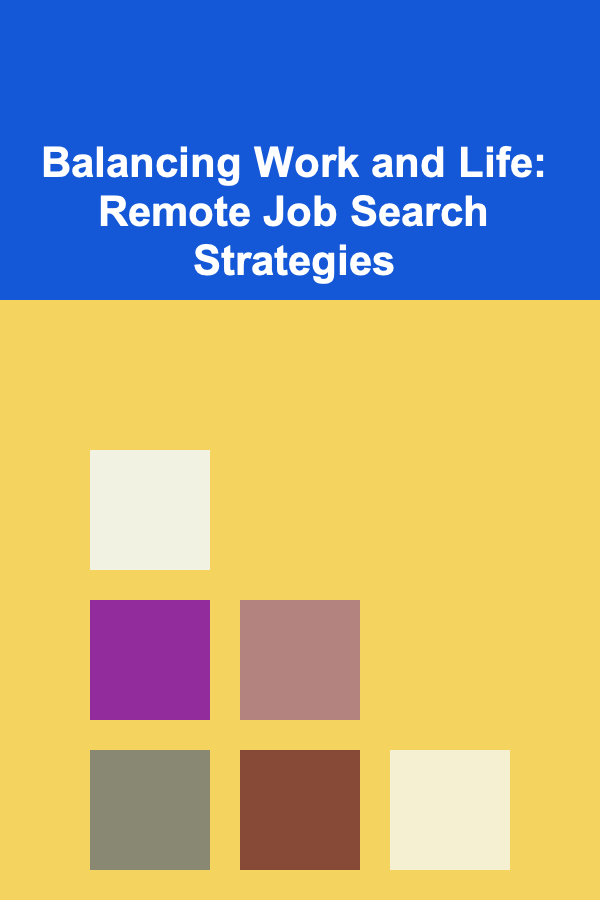
Balancing Work and Life: Remote Job Search Strategies
ebook include PDF & Audio bundle (Micro Guide)
$12.99$8.99
Limited Time Offer! Order within the next:

In today's fast-paced world, achieving a healthy work-life balance is more important than ever. As remote work becomes increasingly common, the boundaries between personal and professional life can blur, creating new challenges for job seekers. However, the flexibility offered by remote jobs also provides incredible opportunities to create a work-life balance that suits individual needs.
In this guide, we will explore actionable strategies for effectively balancing the search for a remote job while maintaining a healthy work-life equilibrium.
Understand Your Priorities and Goals
Before diving into the remote job search, it's essential to identify what a healthy work-life balance means for you. This varies for everyone, but understanding your needs, values, and personal goals will provide a clearer path during the search process.
Actionable Steps:
- Clarify your goals: Are you looking for more flexibility? Do you want to spend more time with family or pursue hobbies? Knowing your personal priorities helps guide your search.
- Set boundaries: Understand what boundaries you need to maintain. For example, you may want to work only certain hours or ensure that your job does not interfere with personal time.
- Identify your non-negotiables: What are the absolute must-haves in a remote job? This could be flexibility, no overtime, opportunities for professional growth, or mental health support.
Why This Matters:
When you are clear about what you're searching for and why, it becomes easier to sift through job listings and focus on those that align with your lifestyle needs. Setting clear priorities at the outset also ensures that you don't waste time applying for roles that ultimately won't contribute positively to your work-life balance.
Create a Structured Job Search Plan
Searching for a remote job can be time-consuming, but having a clear, structured approach can prevent burnout and allow you to balance the search with other aspects of your life.
Actionable Steps:
- Set a job search schedule: Allocate specific hours during the day or week to focus on job searching. For example, you could dedicate 1--2 hours every morning for resume updates, application submissions, and networking.
- Break down tasks into manageable chunks: Instead of diving into everything at once, break the process into smaller tasks such as reviewing job boards, customizing your resume, writing cover letters, and preparing for interviews.
- Track progress: Use a spreadsheet or job search tool to track the positions you've applied for, deadlines, and any follow-up actions needed. This helps you stay organized and reduces anxiety about missing important steps.
Why This Matters:
Without a structured plan, job searching can quickly become overwhelming, especially when balancing other life responsibilities. A plan allows you to focus on specific tasks without getting sidetracked or feeling like you're wasting time.
Leverage Remote-Specific Job Boards and Platforms
With the rise of remote work, many platforms now cater specifically to remote job seekers. These job boards feature listings for roles that can be done from anywhere, helping you find opportunities that fit your lifestyle.
Actionable Steps:
- Use specialized remote job boards : Websites like Remote.co, We Work Remotely, FlexJobs, and Remote OK list jobs from companies that specifically offer remote positions.
- Set up job alerts: To avoid constantly refreshing job boards, set up email notifications for your preferred roles. Most platforms allow you to filter your search by job title, industry, and experience level.
- Join remote job communities: Platforms such as LinkedIn, Reddit, and Facebook have dedicated groups where remote job seekers can share opportunities and advice. Joining these communities allows you to stay updated on remote work trends.
Why This Matters:
Specialized platforms help streamline your search by curating remote job opportunities in one place. They also prevent the frustration of sifting through listings that aren't suited for remote work, saving you time and energy.
Tailor Your Resume and Cover Letter for Remote Work
When applying for remote jobs, it's important to tailor your application materials to highlight your ability to work independently, manage your time effectively, and communicate across virtual platforms.
Actionable Steps:
- Highlight remote-friendly skills: Showcase skills that are especially valuable in remote work environments, such as self-motivation, time management, familiarity with collaboration tools (e.g., Slack, Zoom, Trello), and effective communication skills.
- Customize your resume for each job: Make sure your resume reflects the specific requirements listed in the job description. Tailor the content to demonstrate how your past experiences and skills align with the remote nature of the role.
- Write a compelling cover letter: In your cover letter, mention your experience working remotely (if applicable) or explain why you're excited about the opportunity to work remotely. Show that you understand the challenges of remote work and have the discipline to succeed in such an environment.
Why This Matters:
Remote employers are looking for candidates who are not only qualified but also self-sufficient and capable of thriving in a remote setting. Customizing your resume and cover letter signals that you're prepared for the unique challenges and benefits of remote work.
Network Virtually
Networking plays a vital role in the job search process, and this is no different when seeking a remote role. However, remote job networking often happens in virtual spaces. Building and maintaining professional connections online can significantly increase your chances of landing a remote job.
Actionable Steps:
- Attend virtual events: Many remote work-related conferences, webinars, and online networking events offer opportunities to connect with potential employers and other remote workers.
- Use LinkedIn to connect with professionals: LinkedIn is a valuable tool for remote job seekers. Reach out to individuals in your field or those working in remote positions and express your interest in learning more about the remote work culture at their organizations.
- Engage in online communities: Join online communities such as Slack groups, remote work subreddits, or industry-specific Facebook groups. Participate in discussions and ask for advice from others who are already working remotely.
Why This Matters:
Networking allows you to uncover job opportunities that may not be listed on job boards. Moreover, making connections with others who work remotely can provide valuable insights into companies that are hiring and the remote job market in general.
Manage Time and Set Realistic Expectations
Job searching is often a long and unpredictable process, and it's crucial to manage your expectations and time wisely to avoid feeling overwhelmed or burned out.
Actionable Steps:
- Set realistic goals for your search: Understand that finding the perfect remote job may take time. Set achievable targets such as applying to five jobs a week or securing one informational interview per month.
- Balance job searching with personal life: Dedicate time for self-care, exercise, and relaxation. It's essential to disconnect from job searching to recharge your energy and stay motivated.
- Take breaks: If you find yourself getting frustrated or exhausted, take a break. Go for a walk, spend time with family or friends, or pursue a hobby. Recharging will help maintain your motivation and improve your focus when you return to your search.
Why This Matters:
The job search can sometimes feel like a full-time job in itself, but balancing your time is key to avoiding burnout. Setting boundaries around job search hours ensures you can also enjoy your personal life and maintain the motivation needed to find the right position.
Prepare for Remote Interviews
Once you've secured an interview for a remote position, it's important to prepare both technically and personally. Remote job interviews may differ from in-person interviews, and being well-prepared can help you stand out as a candidate who is ready to embrace the remote work environment.
Actionable Steps:
- Test your tech: Ensure that your internet connection, camera, and microphone are working properly. Test the video conferencing platform (e.g., Zoom, Skype, Microsoft Teams) beforehand to avoid technical issues.
- Prepare your space: Choose a quiet, well-lit location for your interview. Minimize distractions by notifying family members or roommates of your interview time.
- Practice virtual interview skills: During a remote interview, body language and communication style are important. Practice looking directly into the camera, speaking clearly, and maintaining eye contact.
Why This Matters:
The virtual interview is often the first time a potential employer will assess your remote work capabilities. Being technically prepared and ensuring your environment is conducive to a professional interview will help you make a positive impression.
Conclusion
The journey to finding a remote job that aligns with your work-life balance needs can be challenging, but it's also full of potential. By understanding your priorities, creating a structured job search plan, and using the right tools and strategies, you can navigate the search process efficiently while still maintaining balance in your life.
Remember, the key is not to rush the process or sacrifice your personal well-being for the sake of landing any job. Focus on finding a remote role that truly fits your lifestyle, skills, and aspirations. With the right balance, you can achieve both career success and personal fulfillment in the world of remote work.

How to Make a Family Cookbook Together
Read More
How To Research Blockchain and Intellectual Property Rights
Read More
How to Save Space in Your Laundry Room with Efficient Organization
Read More
How to Start a Retirement Fund Early in Your Career
Read More
How to Teach Your Kids the Basics of Gardening Together
Read More
What Are the Best Practices for Organizing Your Home Technology?
Read MoreOther Products

How to Make a Family Cookbook Together
Read More
How To Research Blockchain and Intellectual Property Rights
Read More
How to Save Space in Your Laundry Room with Efficient Organization
Read More
How to Start a Retirement Fund Early in Your Career
Read More
How to Teach Your Kids the Basics of Gardening Together
Read More